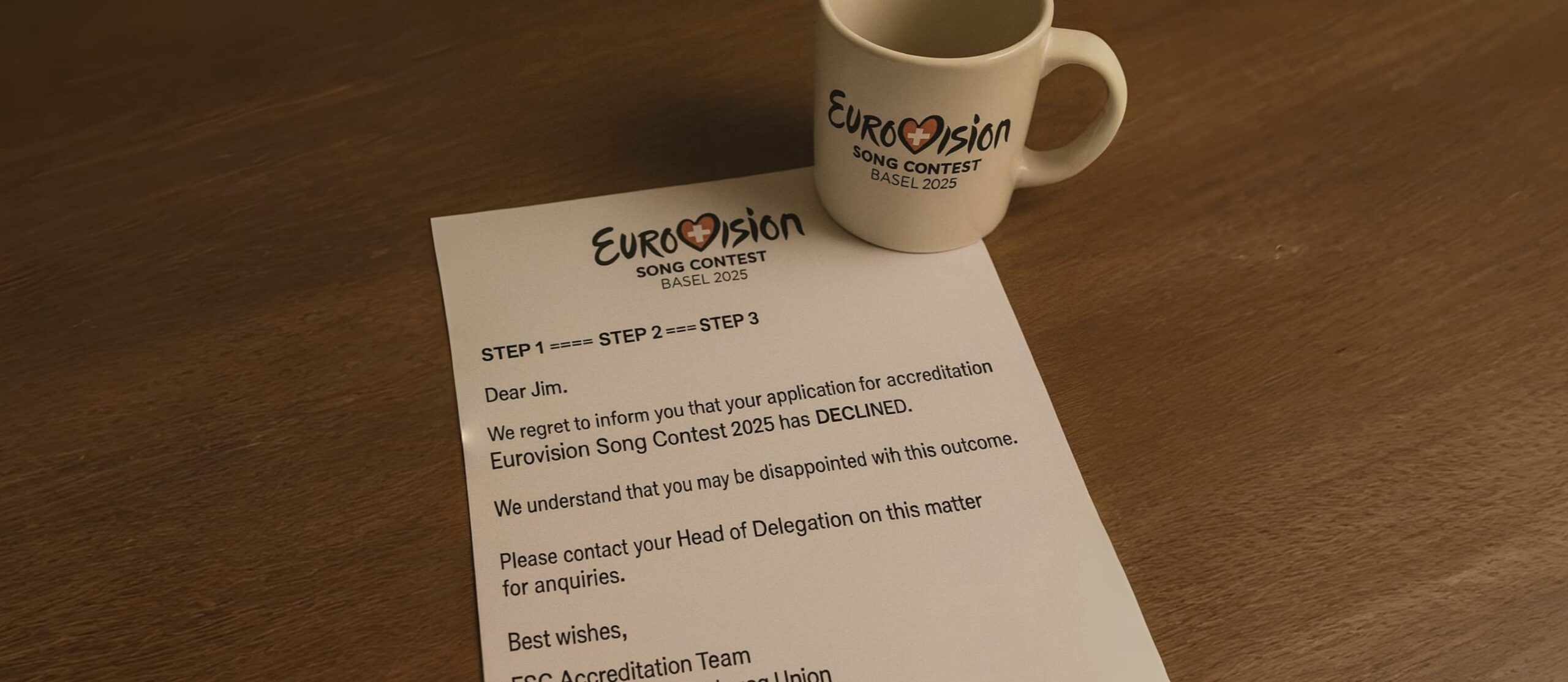I swear if I was Danish or Lithuanian or Greek or something I wouldn’t have this problem.
But (no) thanks to the byzantine bureaucrats at the Brexit Broadcasting Corporation, I have somehow been rejected for media accreditation to cover the higher education aspects of the Eurovision Song Contest for the third year in a row.

It’s all the more baffling because not only did I send them some examples of the pieces I’d write (“Why Eurovision’s new voting algorithm provides inspiration for reform of income contingent student loans”, that sort of thing), I even removed my glasses for the pass photo to avoid a repeat of last year’s fracas in the Euroclub — when an ex-pat from Portugal TV demanded an interview with me in the Euroculub because he thought Ken Bruce had come to see Jedward.
Anyway, undeterred I’ll be flying off later to stay in a converted monastery in this year’s host country Switzerland, where I’ll spend the week leading a double life by pretending to be an academic during the day (so I can eat discounted Zuger Kirschtorte in a mensa) and pretending to be a fan of music at night (so I can watch Croatian entry Marko Bošnjak screaming his way through Poison Cake in a badminton arena.)
And so I thought I’d start the week by looking at where we’re at with Europe.
I place a plank on a plank and call it a boat
Back in 2020, then education secretary Gavin Williamson said that Turing, the post-Brexit successor to Erasmus+, would “expand opportunities to study abroad and see more students from all backgrounds benefit from the experience”.
But since then the living allowance rates have already been cut to the bone (£14 per day for Switzerland, which would barely buy you a Schnitzel and chips), and schools and FE colleges have had their funding capped at about 50 placements each.
The UK government can point and has pointed to increased participation in outward mobility — and a much broader range of countries being visited. But we’re missing out on the social and educational benefits of the collapse in EU inward, and under the headlines, in a huge number of cases, the outward are very short trips rather than proper study abroad.
As I often argue on our SU study tours, the danger in that approach is that you barely get beyond noticing that they call a Twix a Raider before you’re on the flight back — when it’s the longer term immersion that can bring deeper rewards.
And it may all well get worse. In case you hadn’t noticed, there’s a spending review on – and back in March The Times reported that as well as offering up for the chop universal free meals for infants, funding for free period products and a raft of dance, music and PE schemes, secretary of state Bridget Phillipson has suggested that the Turing scheme could go altogether.
Guess which ones would win out of feeding kids, buying tampons, playing the Trombone and flying to Frankfurt for a fortnight.
That’s life, and what a miracle
The EU might yet push us in the other direction, though. There’s an EU summit on 19th May, and the slipstream of trade deals with the US and India, Keir Starmer has been rolling the pitch on a closer partnership with the EU, arguing that the British public has “moved on” from Brexit and suggesting that alignment over food standards, closer working on law enforcement and a “controlled youth mobility scheme” are all on the cards.
That may not be enough. A large group of member states were already frustrated at what intransigence from the UK in the negotiations, mainly over their demand that students using their mobility rights would get to pay the same tuition fees as UK students if they enrol into a UK university for a year or so.
Now they’re demanding a full re-join of Erasmus+, partly because back when we were still part of the scheme, the UK was the third most popular study destination behind only Spain and Germany.
In the Telegraph, Lord Frost – our lead negotiator over the eventual Brexit deal – seems to think that that would continue:
Erasmus will always be a net cost to the UK because more EU students want to come to Britain than Brits want to study in Europe. That is still the case because we have the best universities and the English language. We don’t need to pay the European Commission to get people to come here.
I might be wrong about this – I often am – but right now given the state of the UK and the way in which cuts are raining down in universities, I’d wager that spending a semester in Badajoz, Białystok or Blagoevgrad or whatever looks infinitely more attractive in 2025 than it did in 2019. They’re all more likely to be teaching in English than they were a decade ago, and there’s a much better chance that your chosen modules will actually run when you get there.
And anyway, what Frosty’s little England analysis also misses are the incalculable soft power and medium-term economic benefits that having a large number of EU students coming to the UK for a year offers. People routinely wax on about their Erasmus experience as life-changing – building friendships and connections that later end up as the sort of trading partnerships that Starmer is supposed to be rebuilding.
How much time do we have left together
It’s also worth bearing in mind how Erasmus+ has been changing. As well as the traditional study placements that most will understand, there’s a new European Student Card Initiative (ESCI) which will streamline access to libraries, transport, and cultural activities, a new app offering access to learning agreements, destination information and a digital version of the student card. The European Solidarity Corps offers young people the chance to volunteer or work in projects that benefit communities across Europe, and Blended Intensive Programmes (BIPs) that combine physical and virtual learning, and International Credit Mobility options that extend beyond Europe.
There’s also the DiscoverEU initiative, which provides free rail passes to encourage cultural exploration and connection, new Centres of Vocational Excellence (CoVEs) to drive collaboration between vocational education providers, businesses, and research centres, a Green Erasmus+ initiative, which prioritises projects with a positive environmental impact and offers support for green travel options, and Erasmus+ Teacher Academies — which are supporting the professional development of staff and promoting innovative teaching practice across Europe.
Meanwhile the 64 separate European University Alliances are providing students with the chance to study across multiple countries, the European Degree programme will offer joint qualifications that carry a special European label — making it easier for students to have their qualifications recognised across border — and there’s ongoing work to improve and automate ECTS credit transfer, along with a whole bunch of digital innovation stuff.
Given some of the problems with skills and teaching innovation in the system back home, and the weird reality of an impending credit-based student finance system with barely and progress on credit transfer, add all of that up and any sensible Department for Education would be as desperate to get us back into Erasmus+ and wider EU projects as DSIT was to get us back into Horizon.
Interestingly, Eurovision host country Switzerland – which has of course never been a member of the EU – used to take part in Erasmus+, but was chucked out in 2014 following a referendum that voted to limit mass immigration.
That meant that like us, Swiss universities could no longer participate fully in student exchanges and had to negotiate individual bilateral agreements with each partner university, creating no end of administrative burdens.
SEMP – The Swiss Programme for Erasmus+ – does enable exchange activities, but universities taking part have to finance 40 per cent of costs, with the remaining 60 per cent covered by the federal government.
But since 2023, Switzerland has pursued a new package with the EU, keen to re-establish relations in trade, transport, education, and research. The resultant December 2024 deal granted access to Horizon Europe, Euratom and the Digital Europe programmes earlier this year – and it’s set return to Erasmus+ in 2027 subject to parliamentary approval and a likely referendum in 2026.
(They love their referendums in Switzerland. There was even one to approve the expenditure on Eurovision in the Basel-Stadt canton – the socially conservative EDU called it a “propaganda event” labelling 2024’s event as a “celebration of evil”, while the populist Swiss People’s Party said that the money would be better donated to those seriously affected by Summer 2024’s Swiss storms than “wasted on this embarrassing rainbow event”. United by Music and all that – Yes won by 66.5 per cent to No’s 33.5 per cent.)
Sadly, with UK universities keen to see any pennies left spent on their excel sheets, and higher education stuck in an always-distracted schools department, it may not happen — and if it does, it’ll be down to EU negotiators clocking that Starmer needs a deal that can help neutralise growing youth support for populism back home.













